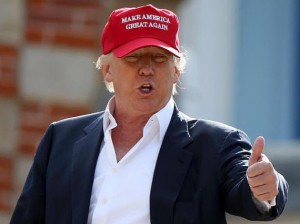 I don’t think anyone knows what a Trump Presidency would look like. In the past, he’s said that he’s pro-choice and he’s said that Mexicans are rapists. He thinks Mussolini quotes are interesting, is reluctant to disavow the Klan leader David Duke, and yet has said that he’s going to bring people together.
I don’t think anyone knows what a Trump Presidency would look like. In the past, he’s said that he’s pro-choice and he’s said that Mexicans are rapists. He thinks Mussolini quotes are interesting, is reluctant to disavow the Klan leader David Duke, and yet has said that he’s going to bring people together.
I suspect — or, rather, hope — that much of what he says is just to appease his voters. (Though think about that for a minute.) But there are some folks who think that Trump could come to be a truly dangerous leader in America.
Lawyers have a big role in preventing tyranny. Like Dick the Butcher says, when plotting another dark rise to power in Henry VI Part II, if you want to take power, the first thing you do is “kill all the lawyers.” So how would the law, as it stands now, respond if Trump is as bad as some people fear?

How LexisNexis CourtLink And Lexis Snapshot Deliver Business Wins
These tools demonstrate that information is power.
I think if you look just at federal criminal law, the law would contain Trump pretty poorly. Here’s the problem — so much of our federal criminal law relies on prosecutorial discretion, which is essentially unreviewable, and prosecutorial discretion is really just a devolved bit of Presidential power. Sure, the line folks in U.S. Attorney’s Offices around the country are likely not on the Trump train, but — as any AUSA will tell you — they’re driven by their offices’ policies. And, ultimately, those policies are set by folks appointed by the President. So, if President Trump wants to bring TrumpCrazy to DOJ, I’m pretty sure it’s going to get there.
What’s worse, our federal laws are loose — they prohibit a broad swath of conduct. And while there used to be a firewall which prohibited prosecutions based on speech, those First Amendment protections have eroded in the face of the broadening of conspiracy liability.
Consider this language from a Fourth Circuit terrorism conspiracy case from 2014:
The trial record reveals that the appellants strove to conceal their nefarious activities from outsiders uncommitted to violent revolution around the world, habitually congregating in secret to discuss their plans and to reinforce, in the manner of zealots, each other’s resolve. That the conspiracy was infiltrated and almost all of its cohorts arrested before they could bring their criminal schemes to fruition should in no way inspire the conclusion that the appellants have been prosecuted for merely harboring ideas, convicted of nothing more than an Orwellian “thoughtcrime.”

4 Ways That Lexis® Create+ Delivers Personalized Legal Drafting
Lexis Create+ merges legacy drafting tools with AI-powered assistance from Protégé and secure DMS integration enabled by the Henchman acquisition.
That case is worth a close read if Trump wins and you worry about how the First Amendment intersects with the criminal law.
Given how deeply divided our country is, there are pockets of the country that would be — as we’ve seen in this election cycle — decidedly TrumpCrazy themselves. Why would that matter? Because federal limits on venue in criminal cases — especially conspiracy cases — have also been eroded. If Trump were to charge a conspiracy, the indictment and charging decisions could be set up to make sure that the case went in front of a judge and a jury that lean his way.
So let’s play this out a little.
Suppose there was some event that catalyzed the national attention against a particular group — say Syrian refugees, but, really, it could be anyone. After September 11, people rallied around the government; it was a good time for expanding executive power. There were some folks who tried to put the brakes on, say, the Patriot Act, but they were few. Another similar event could do much the same thing for Trump.
Imagine, then, that Trump decided he wanted to be aggressive about prosecuting those few people who supported whatever group Trump said we are at war with. Those people are, now, Trump’s political opponents.
Say he has the Department of Justice bring a number of conspiracy cases where the only allegation is that the defendants who are, let’s imagine, anti-Trump politicians, lawyers, and political activists. They’re charged with conspiracy to provide material support to terrorists. This doesn’t require an overt act, just an agreement.
We can all agree that such a prosecution would be bad — it’s exactly what a criminal trial shouldn’t be.
Would our judiciary stop it?
If they’re applying the law the way they’ve been applying it lately, I don’t think they would.
The indictment would properly allege an offense — it doesn’t have say there’s an overt act, and it doesn’t have to say what all the evidence was. The indictment would just have to say that there was an agreement to provide support to terrorists and what some of the goals of the conspiracy were.
If it meets that minimal standard, the case would go to a jury. And, conspiracy to provide material support to a terrorist is a case where the court is to presume that the people charged should be detained.
So, depending on the backbone of the judge and the speed of that court, you could have Trump’s political opponents sitting in prison for months, maybe even years, while the case slowly works its way through trial to the circuit courts, where it’s more likely that something would be done. But as we’ve seen recently, even a year can be a lifetime in politics.
This is a nice — though scary — illustration of how much power courts have given away in the control of criminal cases. That said, I don’t think this scenario is terribly likely. If enough thinking people were to stand up and oppose it, it could be stopped. And, even if Trump is the worst people fear he might be and tries to jail his opponents, there are a hundred things that could happen along the way that could derail that process.
Though in June of last year folks kept saying that there were a hundred things that could happen to derail Trump’s campaign, too.
Matt Kaiser is a white-collar defense attorney at Kaiser, LeGrand & Dillon PLLC. He’s represented stockbrokers, tax preparers, doctors, drug dealers, and political appointees in federal investigations and indicted cases. Most of his clients come to the government’s attention because of some kind of misunderstanding. Matt writes the Federal Criminal Appeals Blog and has put together a webpage that’s meant to be the WebMD of federal criminal defense. His twitter handle is @mattkaiser. His email is [email protected] He’d love to hear from you if you’re inclined to say something nice.